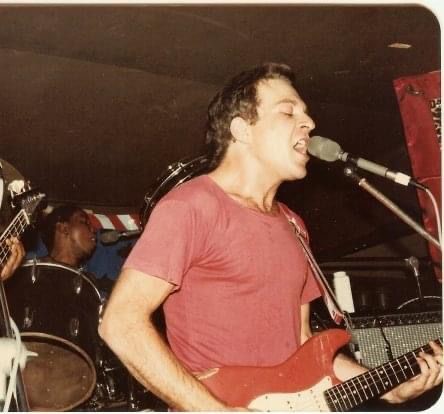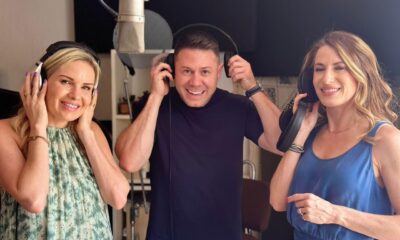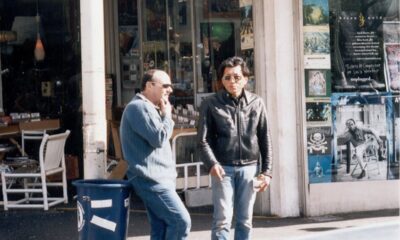
Lifestyle

New film rouses National Wake from rock history
Growing up in Johannesburg, Ivan Kadey could sense the injustices of apartheid, even as a child. So it made sense that as a student in the late 1970s, he would form the interracial punk band National Wake. The band members and their music were a bold statement against the system, and came under intense pressure from security police. This eventually led to them breaking up, seemingly lost to history.
That is, until filmmaker and journalist Mirissa Neff, based in New York, saw the film Punk in Africa, which featured National Wake. She was so impressed, she decided to interview Kadey for a radio piece. On hearing there was to be an album re-release of their music, she returned to film the release party, and then decided to bring their story to the 21st century in her first feature film, This is National Wake.
The film had its New York premiere at the New York Jewish Film Festival on 14 January, and was just screened in Johannesburg at the Encounters South African International Documentary Festival. It will be shown at the same festival in Cape Town on 29 June and 1 July.
Speaking to the SA Jewish Report from his home in Los Angeles, Kadey says, “I had grandparents who lost family in the Holocaust, so I was aware of persecution. As a child, it was impossible not to feel the system and its effects. From a very young age, I was aware of civil-rights music, protest music. That’s what later drove me to form the band.”
Kadey’s father passed away when he was four, after which he, his brother, and his mother lived in the vibrant and multicultural suburb of Yeoville, which influenced his outlook. After she died when he was nine, Kadey lived with an uncle. His cousin in Durban was one of the first activists to be imprisoned under the 180 days of the Suppression of Communism Act, and his brother was also political. All this had an impact on him, and when he got his first guitar at the age of 12, he was drawn to folk and protest music. Then, when he got his first electric guitar, he became motivated to form a rock ’n roll band.
The band started when Kadey was studying architecture at the University of the Witwatersrand (Wits) and living in an interracial commune in Parktown. He was introduced to two brothers “and we hit it off immediately”. The two brothers were Gary and Bernard “Punka” Khoza from Soweto, who would form the core of the band with Kadey, while others came and went.
Kadey wrote music that reflected his anger at the warped world around him. “If your eyes were open, it was all there to see. Writing music was the only way that I could breathe. In war, we all need to choose our weapon. Mine was the guitar and words.”
They released their first album in 1981, coming under escalating police pressure. “The album was suppressed by the Security Branch shortly after its release.” But even before that, they were under surveillance. “At the same time, this was my mission in life. So I negotiated situations. For example, I would get home to see the police were there and had wrecked the house. I would engage with the police on a human level, and explain that this was our work.
“Once we released an album, we became a bigger threat, so to speak, and we were continually harassed.” Sometimes gigs booked by event managers would be cancelled when the owners of the venues realised they were an interracial band.
The pressure eventually got to some of the band members, their commune was evicted, and eventually they broke up. Kadey went on to found a music studio with Lloyd Ross called Shifty Studio. Aimed at providing a platform for independent music with a social message, Shifty was an outlet for South African musicians opposed to apartheid.
While working in his studio in Johannesburg’s Rockey Street, he was electrocuted while opening an iron gate. “My heart stopped, and I had burns on my hands and guitar strings burned onto my face. My girlfriend at the time, now my wife, Nadine, brought me back to life.”
Nadine, a well-known model who worked for the BBC Arena documentary division at the time, filmed the band and their compound, together with Robin Muir. This footage features throughout the movie, and Nadine is a co-producer.
When Kadey left South Africa in 1986, “things looked very bleak”, but if he had known the African National Congress would be unbanned four years later, “I probably wouldn’t have left.” He works as an architect and recently released an album under the iKD Band. He’s excited about the film and the celebrations around it.
He also remains rooted in Africa and his Jewish heritage. “My father’s parents were born in Lithuania, and my mother’s grandparents were born there. So, I’m a third generation South African and my son, in the few years he lived in South Africa, was the fourth generation.
“In the film, I speak about how 95% of the South African Jewish community is of Lithuanian extraction, which motivates you from some deep sense to have a wariness of the abuse of power. Both my grandmothers in particular instilled this in me.”
He’s thrilled to bring the documentary home to a South African audience, as is Neff. “To have the film’s African premiere at the Bioscope, with friends and family of National Wake in attendance, was profound,” Neff told the SA Jewish Report after the Johannesburg events. “Especially since the cinema is located mere minutes from the band’s old stomping grounds in Parktown. It was always a top priority to bring the film home to South Africa, but to do so with the Encounters Film Festival exceeded my expectations.”
The film will be screened in Cape Town at the V&A Waterfront Ster-Kinekor on 29 June at 20:30, and at the Vuma Pop-Up of the festival at Denis Goldberg House of Hope in Hout Bay on 1 July at 14:00.











Orry
July 3, 2023 at 1:17 pm
Would be cool to watch this in JHB 🤷♂️